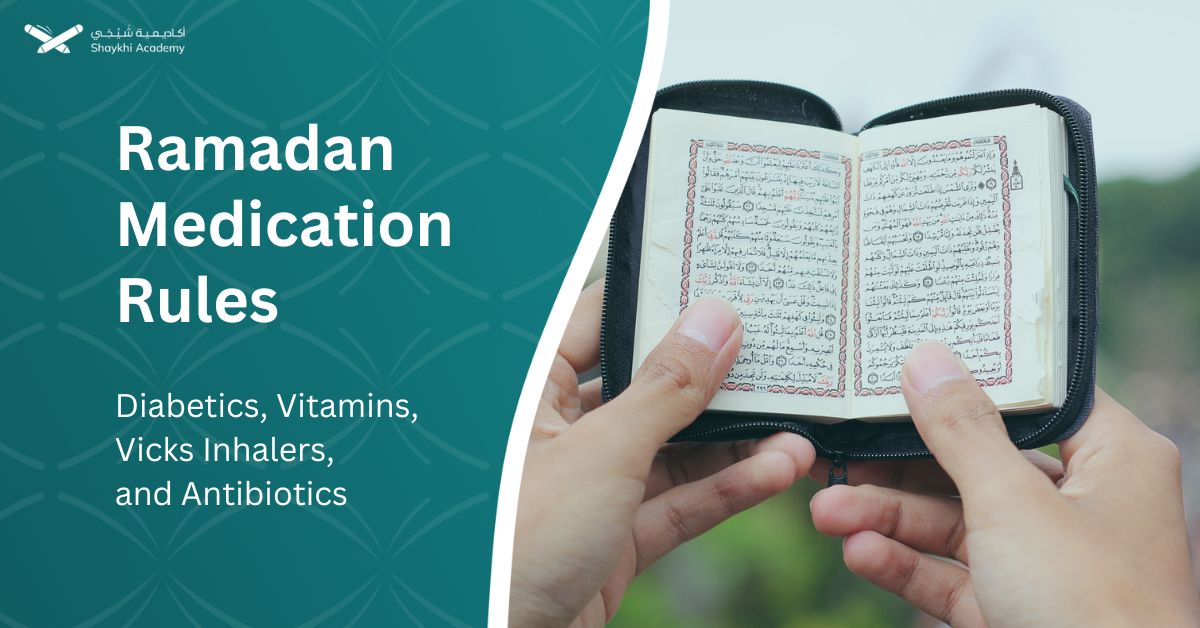As Muslims embark on the spiritual journey of Ramadan, navigating Ramadan Medication Rules is an essential aspect of balancing health and religious observance. Understanding the guidelines provided by Islamic scholars, seeking consultation with healthcare professionals, and maintaining clear intentions are crucial steps in ensuring a harmonious approach to medication use during this sacred month.
By addressing common concerns related to fasting, diabetics, vitamins, Vicks inhalers, and antibiotics, Muslims can observe Ramadan with both spiritual devotion and a commitment to maintaining their well-being.
What Is the Meaning of Ramadan Medication Rules?
Ramadan medication rules refer to the guidelines and regulations set forth within the context of Islamic Shariaa (Islamic law) regarding the use of medication during the holy month of Ramadan.
Ramadan medication rules address various questions and concerns related to the permissibility and practicalities of taking medication while fasting. These rules are based on interpretations of Islamic jurisprudence and aim to provide guidance to Muslims facing health challenges during this religious observance.
Can I Take Medicine While Fasting in Ramadan?
Yes, you can take medicine while fasting in Ramadan if it is necessary for your health, but with taking medicine, you are now refraining from fasting. Fasting during Ramadan is mandatory, but Islam recognizes the importance of maintaining one’s health.
According to Islamic Shariaah, if someone is unwell and needs to take medicine during the day in Ramadan, it is permissible for them to take the dispensation to refrain from fasting.
This permission is based on the Quranic verse: “The month of Ramadhan [is that] in which was revealed the Qur’an, a guidance for the people and clear proofs of guidance and criterion. So whoever sights [the new moon of] the month, let him fast it; and whoever is ill or on a journey – then an equal number of other days. Allah intends for you ease and does not intend for you hardship and [wants] for you to complete the period and to glorify Allah for that [to] which He has guided you; and perhaps you will be grateful.” (Al-Baqarah 2:185).
True fasting involves complete abstinence from food, drinks, and any substances entering the stomach. Therefore, if the medicine is necessary, it is permissible to take it during the day of Ramadan, but the fast is invalidated. If you have a medical condition requiring daytime medication, you are allowed to abstain from fasting and instead provide Fidyah (compensation) by feeding a poor person for each missed day of fasting.
However, if there is hope for recovery from the medical condition, Fidyah is not required. Instead, the person can make up for the missed days of fasting later, once their health improves. And Allaah Almighty knows best.
Can I Use Vicks Inhaler While Fasting?
Yes, you can use Vicks inhaler while fasting, as it involves inhaling non-ingestible substances that do not reach the stomach and, therefore, do not invalidate the fast. Understanding the nature of these inhalers and their impact on fasting is crucial for individuals seeking clarity on this matter.
Most scholars agree that using non-inhalable substances, such as Vicks inhalers that do not reach the stomach, does not break the fast. The primary concern is avoiding the introduction of substances into the body through routes that nullify fasting. If the product is solely in the form of fragrance without any substantial intake, then it would be considered makrooh (discouraged) but the fast would remain valid.
And Allaah Almighty knows best.
Can Diabetics Fast During Ramadan?
Yes, diabetics can fast during Ramadan, but the permissibility depends on the impact fasting has on their health condition. Diabetics face unique challenges during Ramadan, given the need for consistent monitoring of blood sugar levels and insulin intake. While fasting is a fundamental aspect of Ramadan, ِAllaah exempts those whose health may be adversely affected by fasting.
The ruling on fasting for diabetics during Ramadan depends on the impact fasting has on a diabetic’s health condition and whether it poses harm. If a sick person finds fasting challenging, yet it does not pose harm, it is considered makruh (discouraged) for them to fast, and it is Sunnah (recommended) for them to break their fast. However, if fasting is difficult and harmful, such as in cases of kidney disease or severe diabetes, it becomes haram (forbidden).
Some with health conditions may make a mistake by persisting in fasting despite the potential harm, rejecting the concession granted by Allah. This refusal to accept Allah’s kindness and concession is a self-inflicted harm, although Allah says:
“And do not kill yourselves [or one another]. Indeed, Allah is to you ever Merciful.” (al-Nisa 4:29).
The well-being of the individual takes precedence, and alternative acts of worship or charitable deeds can be undertaken as a substitute for fasting. Allah’s Messenger (ﷺ) said:
“Allah the Most High loves that His permissions be practiced, just as he dislikes that disobedience to Him be committed.” [Ahmad reported it. Ibn Khuzaimah and Ibn Hibban graded it Sahih (authentic)].
Diabetics considering fasting during Ramadan are strongly encouraged to consult with healthcare professionals. Medical advice can help determine whether fasting is safe and how to manage medication and insulin requirements effectively during this period. And Allaah Almighty knows best.
Is it Permissible to Check Blood Sugar Levels While Fasting?
Yes, it is permissible to check blood sugar levels by extracting blood from veins for testing purposes while fasting, it will not invalidate the fast according to the probable opinion in Islamic Law. However, if this is done frequently, it is advisable to postpone it until nighttime. If performed during the day, as a precaution, it would be recommended to make up for that day, as it is considered similar to cupping. And Allaah Almighty knows best.
Can You Take Antibiotics in Ramadan?
Yes, you can take antibiotics in Ramadan like other medications under the same conditions we mentioned. So, t is generally permissible to take antibiotics during the daytime of Ramadan if they are necessary for treating infections or illnesses, with the understanding that Fidyah (compensation) or making up for missed fasting days may be required. However, the permissibility depends on the condition and the professional medical advice received.
In cases where antibiotics are necessary for treating infections or illnesses, scholars generally permit their use like other medicines, then there is Fidyah or making up for the missed days. So, It is permissible, depending on the condition and what doctors deem necessary.
Similar to other medications, individuals taking antibiotics during Ramadan are advised to have clear intentions focused on health preservation. The key consideration is the preservation of health, and antibiotics are viewed as a means to achieve this goal.
However, if the antibiotics are prescribed for a non-urgent condition like acne, it is not permissible to break the fast and the medication can be taken either before the pre-dawn meal (Suhoor) or after the sunset mea (Iftar). And Allaah Almighty knows best.
Can You Take Vitamins During Ramadan?
Yes, you can take your vitamins after the pre-dawn meal (Suhoor) as long as it’s before dawn breaks, and there’s no issue with that. You cannot take vitamins during the daylight hours in Ramadan, because it is not permissible to introduce anything into a person’s stomach during the day in Ramadan, whether it is vitamins or anything else.
Vitamins play a crucial role in maintaining overall health, and their use during Ramadan is a common query. Islam encourages the preservation of health, and scholars generally permit the use of vitamins during nighttime in Ramadan.
Muslims are allowed to eat and drink until dawn during fasting. Once dawn arrives, it is forbidden to consume anything, whether it’s food or medicine. Allah says:
“And eat and drink until the white thread of dawn becomes distinct to you from the black thread [of night].” [Al-Baqarah 2:187].
The lingering effects of food and medicine throughout the day in Ramadan are considered blessings of suhoor. Therefore, it is recommended to delay suhoor to ensure strength for fasting during the day in Ramadan.
Anas reported God’s messenger as saying, “Take a meal a little before dawn, for there is a blessing in taking a meal at that time.” (Bukhari and Muslim).
And Allaah Almighty knows best.
Make Ramadan 2025 Your Quranic Turning Point with Shaykhi Academy!
Tired of feeling overwhelmed or lost in your Quranic journey? Shaykhi Academy, founded by experienced Quran teachers, offers a unique solution:
- Expert teachers: Learn from highly qualified instructors, most graduated from Al-Azhar University and hold Ijazah certificates, ensuring authentic Quranic pronunciation.
- Tailored learning: Whether you’re a beginner, busy adult, or have children, Shykhi Academy has personalized courses for all ages and needs.
- Exclusive curricula: Authored by our co-founder, ensuring proficiency in Arabic and Tajweed.
- Convenient online platform: Learn from the comfort of your home, at your own pace.
Don’t let this Ramadan pass you by!
This Ramadan, empower yourself and your loved ones with the gift of Quranic knowledge.
Shykhi Academy can guide you! Book your free trial now and make Ramadan 2025 your Quranic turning point!

Conclusion:
During Ramadan, medication use while fasting follows Islamic guidelines to balance health and religious obligations. Taking medicine during fasting hours breaks the fast unless necessary, in which case missed days can be compensated.
Vaping, unlike inhalers, invalidates the fast as it introduces substances into the body. Diabetics may fast if medically safe, but Islam permits breaking the fast if health is at risk. Checking blood sugar does not invalidate fasting, while antibiotics and vitamins should be taken before dawn or after sunset. Consulting religious and medical experts ensures a proper approach to fasting with health concerns.

















































